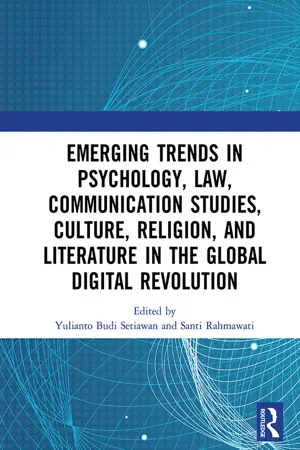
Emerging Trends in Psychology, Law, Communication Studies, Culture, Religion, and Literature in the Global Digital Revolution
Proceedings of the 1st International Conference on Social Sciences Series: Psychology, Law, Communication Studies, Culture, Religion, and Literature (SOSCIS 2019), July 10 2019, Semarang Indonesia
- 126 pages
- English
- ePUB (mobile friendly)
- Available on iOS & Android
Emerging Trends in Psychology, Law, Communication Studies, Culture, Religion, and Literature in the Global Digital Revolution
Proceedings of the 1st International Conference on Social Sciences Series: Psychology, Law, Communication Studies, Culture, Religion, and Literature (SOSCIS 2019), July 10 2019, Semarang Indonesia
About This Book
The Fourth Industrial Revolution has the potential to raise global income levels and improve the quality of life for populations around the world. Technology development of AI, self-driving, big data, the Internet of things, and many digital revolutions have changed how people interact with each other. Therefore, developing a comprehensive and globally shared view of how technology is affecting our lives and reshaping our social, cultural, and human environments is essential. There has never been a time of more significant promise, or one of greater potential peril. Today's decision-makers, however, are too often trapped in traditional, linear thinking, or too absorbed by the multiple crises demanding their attention, to think strategically about the forces of disruption and innovation shaping our future.
The main goal of the conference was to provide an outlet for papers discussing the importance and impact of industrial revolution 4.0 to influence social aspect in human life. The proceedings consist of papers covering issues on psychology, law, communication studies, culture, religion, and literature. The proceedings will provide the latest research and constitute a concise but timely medium for the dissemination.
The Proceedings of the 1st International Conference on Social Sciences Series (SOSCIS 2019) will be invaluable to professionals and academics in psychology, law, communication studies, culture, religion, and literature.
Frequently asked questions
Information
Implementation of well-designed interior spaces, with psychological concepts and solutions for private workspaces in Surabaya
1 INTRODUCTION
2 RESEARCH METHODOLOGY
Table of contents
- Cover
- Half Title
- Title Page
- Copyright Page
- Table of Contents
- Foreword
- Organizing Committee
- Scientific Committee
- Analysis of personality and behavioral performance
- The role of leaders in cultivating Islamic values in companies
- The effects of positive and negative emotion on viral marketing effectiveness
- Teachers’ revelations on self-motivation
- Legal protection for consumers in online transactions
- Legal protection of passing-off well-known marks for the welfare of consumers in Indonesia
- Resilience in adolescents infected with HIV/AIDS
- Reconstruction of the legal protection concept Janda Cerai in the Batak Toba community based on the value of justice
- Duality of structure in the Family Welfare and Empowerment organization (PKK)
- Blonde hair as symbol of Patrick Bateman’s displacement in American Psycho: Semiotic approach
- Authority of religious court in settlement of the Shariah banking dissolution
- Implementation of well-designed interior spaces, with psychological concepts and solutions for private workspaces in Surabaya
- Small industry and the relationship with protecting and managing the environment
- Redefining the relationship of majority and minority as a social principle
- The scooter motorbike market monopoly by Honda and Yamaha in Indonesia, 2016–2019
- Supervision of environmental permits as a juridical instrument for protection environment based on community
- Malacca Portuguese intangible cultural heritage: An approach to cultural mapping
- Controlling the emotions of children with autism with social stories while at school
- Employability factor to improve readiness for changes
- The challenges of the online journalism in the industrial revolution 4.0. era in Indonesia
- Responding to the circulation of hoaxes using media literacy and information culture
- School resilience and religious radicalism in senior high schools
- Implementation of occupational health and safety management system in human resources development to improve performance
- The influence of WhatsApp on improvements for fish farmers: A lesson from Semarang City, Indonesia
- The pragmatic force of expressive speech acts of the Banyumasan Javanese language in sale and purchase transactions in Pasar Wage, Purwokerto Timur District, Banyumas Regency
- Reconstruction of regulations dealing with the period of the presidents’ term to minimize the abuse of power
- Sociocultural theory applied to collaborative learning in writing strategies
- Author Index